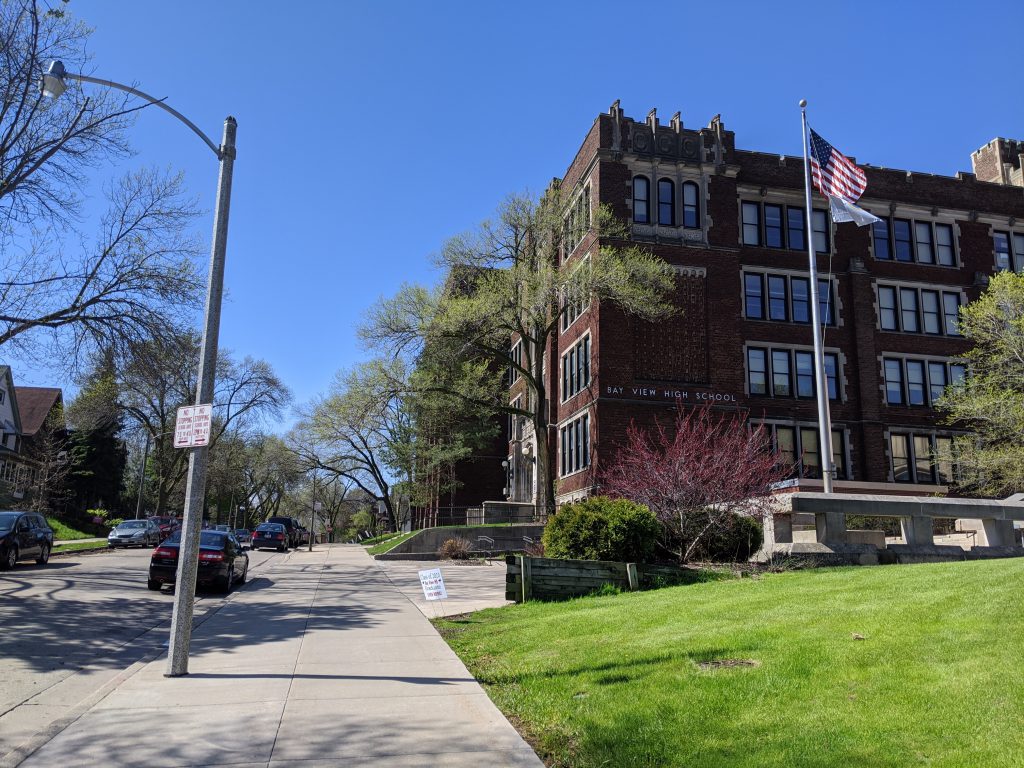MPS Referendum Would Reverse Effects of Declining State Funding
The district's enrollment has declined by 31.5% and staffing by 36.8% since 2004.
The $252 million school funding referendum heading for Milwaukee ballots this spring could reverse the current trend of declining funding and fill a $200 million budget gap.
The story told in a new report by the Wisconsin Policy Forum is a familiar one for public institutions during the past decade. That is, the state funding for education has been lagging behind inflation, putting Milwaukee Public Schools further and further behind the budgetary eight ball.
Compounding the familiar problem of poor state funding is what the policy forum calls the “single biggest reason” for MPS’ revenue declines: “the district’s loss of enrollment due to demographic shifts, competition from independent charter and state-funded voucher schools, and other factors.”
If the voters approve the referendum, MPS will escape its downward revenue spiral. But because of long-term underfunding it still won’t have the purchasing power it had two decades ago, according to the report, titled “The ABCs of the 2024 MPS Referendum.”
With state funding falling behind inflation, the district has fewer dollars, in real terms, to educate students. The state is also providing less funding for special education than it has in the past, forcing MPS — which has the highest percentage of students with disabilities in the state — to pull funding from its general operating revenues to cover the difference.
In 2020, when MPS went to the voters with an $87 million referendum, the hope was that this funding would fill its projected budget gaps. But, as the policy forum notes, “What district leaders could not have predicted was the surge in the rate of inflation, which both reduced the purchasing power of the $87 million and led them to provide matching cost-of-living salary adjustments for staff.”
Between 2004 and 2024, MPS has lost nearly one-third (31.5%) of its enrollment. These declines have impacted the per-pupil revenue from the state, contributing to declining funding, but they also raise questions among opponents of the referendum, according to the report. Namely, has the district downsized it’s staffing and facilities in response to declining enrollment? And if not, why?
The policy forum notes that not all costs can be reduced proportionally to declining enrollment, and that considerations about class sizes, educational offerings and the impacts on children and families must be considered when it comes to staffing and building reductions.
The district has only reduced its facilities by 3.2% from the peak in 2008. But its staffing has actually outpaced enrollment loss, declining 36.8% since 2004. The district still maintains a number of unfilled positions in the budget, contributing to millions in operational savings and recent end-of-year budget surpluses.
Budget projections by MPS that show it filling hundreds of these vacant positions in the coming years is the largest contribution ($45.1 million) to the projected $200 million budget deficit.
“Filling and sustaining these positions may be defensible in many respects, but it is difficult to assess their need without the benefit of an overall staffing plan for the district that takes into account its reduced enrollment and the realities of today’s labor market,” the report states.
As voters consider the referendum, the policy forum said “compelling arguments” can be made both for and against the referendum; with supporters able to argue that, despite declining enrollment, there is less money to spend on students education than in the past, and opponents able to raise questions about the districts’ response to declining enrollment in terms of staffing and facilities.
“In the end,” the report concludes, “voters have a lot to consider.”
Read the full report The ABCs of the 2024 MPS Referendum on Urban Milwaukee.
If you think stories like this are important, become a member of Urban Milwaukee and help support real, independent journalism. Plus you get some cool added benefits.
More about the 2024 MPS Referendum
- K-12 Education: MPS Plans $60 Million In Budget Cuts - Terry Falk - Apr 22nd, 2024
- Following Referendum, MPS Cuts Trauma Specialists in 53206 ZIP Code - Corrinne Hess - Apr 17th, 2024
- MMAC statement on MPS referendum - Metropolitan Milwaukee Association of Commerce - Apr 3rd, 2024
- City Forward Collective Responds To The Outcome of the MPS Referendum - City Forward Collective - Apr 3rd, 2024
- MTEA President Ingrid Walker Henry: Statement on Passage of MPS Referendum - Milwaukee Teachers’ Education Association - Apr 2nd, 2024
- Statement from GMC on April 2nd MPS referendum - Greater Milwaukee Committee - Mar 26th, 2024
- MPS Referendum Would Reverse Effects of Declining State Funding - Graham Kilmer - Mar 12th, 2024
- K-12 Education: Is Building Surplus a Factor in MPS Referendum? - Terry Falk - Mar 11th, 2024
- Campaign Targets MPS Funding Referendum - Graham Kilmer - Feb 24th, 2024
- Campaign Wants You To “Vote Yes For MPS” On School Referendum - Graham Kilmer - Feb 22nd, 2024
Read more about 2024 MPS Referendum here























Wisconsin had a $7.1 billion surplus at the end of fiscal 2023. A significant portion of that revenue was collected in the form of taxation. The GOP claims to want smaller government and lower taxes, so instead of increasing taxes for MPS by another $252 million how about the people being taxed insist that the state pony up their school funding to meet the increase of inflation first and then revisit the proposed referendum afterward?